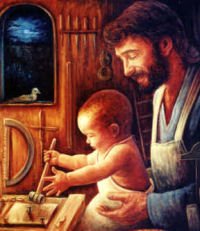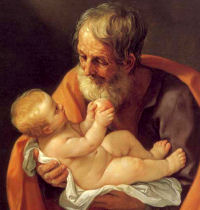Lent: March 20th
Solemnity of St. Joseph, Spouse of the Blessed Virgin Mary
» Enjoy our Liturgical Seasons series of e-books!
St. Joseph, the spouse of the Blessed Virgin Mary and the foster-father of Jesus, was probably born in Bethlehem and probably died in Nazareth. His important mission in God's plan of salvation was "to legally insert Jesus Christ into the line of David from whom, according to the prophets, the Messiah would be born, and to act as his father and guardian" (Directory on Popular Piety and the Liturgy). Most of our information about St. Joseph comes from the opening two chapters of St. Matthew's Gospel. No words of his are recorded in the Gospels; he was the "silent" man. We find no devotion to St. Joseph in the early Church. It was the will of God that the Virgin Birth of Our Lord be first firmly impressed upon the minds of the faithful. He was later venerated by the great saints of the Middle Ages. Pius IX (1870) declared him patron and protector of the universal family of the Church.
This Solemnity normally falls on March 19 but has been transferred since it falls on a Sunday.
St. Joseph
 St. Joseph was an ordinary manual laborer although descended from the royal house of David. In the designs of Providence he was destined to become the spouse of the Mother of God. His high privilege is expressed in a single phrase, "Foster-father of Jesus." About him Sacred Scripture has little more to say than that he was a just man-an expression which indicates how faithfully he fulfilled his high trust of protecting and guarding God's greatest treasures upon earth, Jesus and Mary.
St. Joseph was an ordinary manual laborer although descended from the royal house of David. In the designs of Providence he was destined to become the spouse of the Mother of God. His high privilege is expressed in a single phrase, "Foster-father of Jesus." About him Sacred Scripture has little more to say than that he was a just man-an expression which indicates how faithfully he fulfilled his high trust of protecting and guarding God's greatest treasures upon earth, Jesus and Mary.
The darkest hours of his life may well have been those when he first learned of Mary's pregnancy; but precisely in this time of trial Joseph showed himself great. His suffering, which likewise formed a part of the work of the redemption, was not without great providential import: Joseph was to be, for all times, the trustworthy witness of the Messiah's virgin birth. After this, he modestly retires into the background of holy Scripture.
Of St. Joseph's death the Bible tells us nothing. There are indications, however, that he died before the beginning of Christ's public life. His was the most beautiful death that one could have, in the arms of Jesus and Mary. Humbly and unknown, he passed his years at Nazareth, silent and almost forgotten he remained in the background through centuries of Church history. Only in more recent times has he been accorded greater honor. Liturgical veneration of St. Joseph began in the fifteenth century, fostered by Sts. Brigid of Sweden and Bernadine of Siena. St. Teresa, too, did much to further his cult.
At present there are two major feasts in his honor. On March 19 our veneration is directed to him personally and to his part in the work of redemption, while on May 1 we honor him as the patron of workmen throughout the world and as our guide in the difficult matter of establishing equitable norms regarding obligations and rights in the social order.
—Excerpted from The Church's Year of Grace, Pius Parsch
St. Joseph is invoked as patron for many causes. He is the patron of the Universal Church. He is the patron of the dying because Jesus and Mary were at his death-bed. He is also the patron of fathers, of carpenters, and of social justice. Many religious orders and communities are placed under his patronage.
Patronage: against doubt; against hesitation; accountants; attorneys; barristers; bursars; cabinetmakers; carpenters; cemetery workers; children; civil engineers; confectioners; craftsmen; dying; educators; emigrants; exiles; expectant mothers; families; fathers; furniture makers; grave diggers; happy death; holy death; house hunters; immigrants;
interior souls; joiners; laborers; lawyers; married people; orphans; people in doubt; people who fight Communism; pioneers; pregnant women; social justice; solicitors; teachers; travellers; unborn children; wheelwrights; workers; working people
Church declarations: Catholic Church (proclaimed on 8 December 1847 by Blessed Pope Pius IX);
Oblates of Saint Joseph; protection of the Church; Universal Church (proclaimed on 8 December 1847 by Blessed Pope Pius IX); Vatican II
Countries: Americas; Austria (given in 1675); Belgium; Bohemia (proclaimed in 1654 by Pope Innocent X; May 14, 1914 by Pope Pius X; December 11, 1935 by Pope Pius XI); Canada (given in 1624); China; Croatian people (in 1687 by decree of the Croatian parliment); Korea; Mexico (given in 1555); New France; New World; Papal States; Peru (given in 1828); Philippines (given in 1565); Vatican City (given in 2013); Viet Nam
See Catholic Saints Info for more listings of patronages.
Symbols and Representation: bible; branch; carpenter‘s square; carpenter‘s tools; chalice; cross; hand tools; infant Jesus; ladder; lamb; lily; monstrance; man holding a lily and a carpenter‘s tool such as a square; man holding the infant Jesus; plane; rod
Highlights and Things to Do:
- Read more about St. Joseph:
- CatholicSaints.info has an amazing list of prayers, articles, books, and other information on St. Joseph.
- Watch or listen to the Catholic Culture podcast with Elizabeth Lev on St. Joseph in Art History.
- For the Year of St. Joseph in 2021, there were several Catholic Culture audiobooks dedicated to St. Joseph:
- Jacques-Bénigne Bossuet—St. Joseph: A Man after God’s Own Heart
- Jacques-Bénigne Bossuet—St. Joseph: Guard What Has Been Entrusted to You
- Pope St. John Paul II—Redemptoris Custos: On the Person and Mission of St. Joseph in the Life of Christ and of the Church
- Pierre-Thomas Dehau, OP—Family and Holy Family: The Father
- A table overflowing with good Italian food honoring St. Joseph is a traditional Sicilian custom. The feast of San Giuseppe began in the Middle Ages when Sicily was suffering from a severe drought and the desperate people begged St. Joseph for rain. When they received rainy weather in response, they held a huge "feste" in Saint Joseph's honor. Even today, Sicilians go to Mass before their St. Joseph's day dinner and then process to their festive tables, decked out in flowers, breads, and all sorts of Italian foods. The priest blesses the food, and everyone shouts "Viva la tavola di San Giuse!" (which your children will readily do with great gusto). After the meal is done, everyone present is given something to take home, in the generous spirit of this day. Try some of our delicious recipes linked here.
- Plan a St. Joseph's potluck for this day with other Catholic families — invite a parish priest and ask his blessing over the food before you begin the meal. If you do not have the time or resources to do this, plan a smaller affair with your own family, complete with prayers to St. Joseph, a little procession with candles for the older children and your favorite hymns, and then the father of the family ought to say a special blessing over the food before you begin.
- Check out this wonderful site for a Virtual St. Joseph Altar more in detail, includes recipes, history, and allows virtual offerings. They celebrated their 25th year in 2023!
- For further reading:
- Saint Joseph Altars by Kerri McCaffety (Photographer).
- A Table for Saint Joseph: Celebrating March 19th with Devotions, Authentic Italian Recipes, and Timeless Traditions by Mary Anne Scanlan Grasso.
- The Saint Joseph's Day Table Cookbook by Mary Ann Giordano.
- Read the section of Directory on Popular Piety and Liturgy on St. Joseph.
- Read Pope Leo XIII's encyclical on Devotion to St. Joseph.
- Interested in history? Read this article on the history of devotions to St. Joseph, Finding St. Joseph, by Sandra Miesel.
- Pray this prayer and litany in honor of St. Joseph with your family rosary tonight.
- Here is a link to several meditations on St. Joseph — choose the one that is perfect for you and your family!
- Here are some ideas for teaching children about St. Joseph.
- See Catholic Cuisine for some food ideas for St. Joseph's Solemnity.
We especially recommend the traditional Minestrone. Italian sausage is always a favorite, as well.
And there should be bread of all kinds — this recipe for Italian Decorative Breads can provide the traditional shape of your choice (St. Joseph's staff, his beard, etc).
Also a traditional must with children is St. Joseph's Sfinge, (Cream Puffs), for which we have several recipes on this site.






